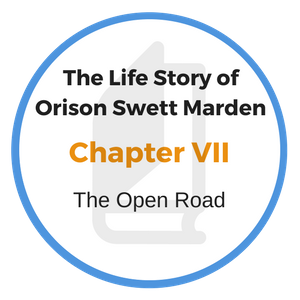- Home
- Self Growth Library
- Orison Swett Marden Chapter VI
Orison Swett Marden Chapter VI
The Solace Of Nature
The Life Story of Orison Swett Marden Chapter VI:
The new experience brought little change to the waif again cast adrift on life's sea. A sullen, gray, monotonous sea it continued to be — a never-ending stretch of toilsome days and weary nights — nights in which, through sheer misery and utter exhaustion of mind and body, he often sobbed himself to sleep.
To go over his struggles in this or in any of the following homes in which his guardian had placed him, would be to change only the details of the picture. In all of them the broad outlines remain the same.
Regarding him as an interloper, each of the five different families in which he was bound out seemed to think that a homeless orphan had no rights that anybody was bound to respect. To be cuffed and whipped, and starved, worked to the limit of human endurance, abused and insulted, — this was the uniform experience of the "hired boy," Orison Marden.
Although at that time, especially in remote country places, the hired boy or girl, hired help in general, was treated as a member of the family, this was not Orison's good fortune.
When the family had company he was supposed to eat in the kitchen alone. On the rare occasions when he happened to be present, when neighbors dropped in unexpectedly, or for some other reason, he was, as at Elder Strong's, put under severe restrictions. He could not partake of the tempting flavors, which were apparently put to his lips only to be snatched away before he could taste them. He was warned beforehand that he must not eat any of the delicacies passed to him — cakes, preserves, pudding, or such other luxuries as marked for the entertainment of guests!
Like Lincoln, wherever young Marden went he found something to laugh at. His love of joking and his sense of humor were always breaking through, even in the most trying situations.
"His love for Nature was a passion. It kept alive in him a belief in the
benevolent Creator who planned and sustained the universe."
Recalling his life in the home of the worthy Mr. and Mrs. Joshua Chapman, he says: "They were a strange couple. I well remember the impression they made on me the first day I saw them — the day I went to live with them. Mr. Chapman was a surveyor, a kindly, pleasant man, but of no force of character. His wife was his opposite in every respect.
She was very short, while he was very tall, and proportionately large. In fact, he was almost twice as tall as his wife, and she was nearly twice as old as he. A couplet composed by their neighbors at the time of their marriage, I was told, fastened itself in my memory. It ran thus:
Joshua Chapman, three times six and three,
To Mary G. Bailey, twice as old as he.
"Mrs. Chapman was of a fiery temperament, and when she got mad she used to delight in pounding me on the back. At all events, this was her favorite method of punishing me, and I rather enjoyed the humor of it. I was then growing rapidly, and was so much taller than she was that she would have to stand on tiptoe to get at my back.
"Concentration is the factor that causes the great discrepancy between men and the results they achieve... the difference in their power of calling together all the rays of their ability and concentrating on one point."
- Orison Swett Marden
Orison Swett Marden Chapter VI , continued...
She could not handle me very well in any other way, and the situation was so ludicrous that I could hardly keep from laughing out loud. This, of course, would have made her angrier than ever. But I couldn’t help picturing the comic appearance of the irate little woman, on her tip-toes in her frantic efforts to pummel my back!"
Working from dawn till dark, with a little intermittent schooling in winter when there was no work to be done on the backwoods farm — barefooted and poorly clad — sleeping in an attic under the eaves, sometimes on the bare floor, without a mattress, the snow blowing over him and the cold so intense that he could hardly go to sleep, Orison struggled on toward adolescence.
Altogether apart from physical suffering, the hardships of the body, cold, hunger, hard work, blows, there was a deeper sense of need growing steadily within the boy. His spiritual nature was crying out for food. His soul was starving.
Deprived of his natural and inherited rights, those boyhood years, which should have been the happiest and most care-free of his life, were full of unsatisfied questionings, desires, longings, doubts and fears. There was no one to answer his questions; no one to allay his doubts and fears; no one to sympathize with his unspoken yearnings. The Church frightened and repelled him. There was no one to whom he could turn for sympathy, for enlightenment, for love.
Fortunately the boy had one outlet, one refuge from his misery, — an inborn love of Nature.
To her, the universal Mother, Mother Nature, he turned for the mothering, the solace and comfort denied him on the human plane.
"Everything in Nature seemed to speak to me," he said, "to try to make up to me for my homelessness and loneliness. I loved every bit of it. Often in an ecstasy of emotion I would throw my arms around the trees and hug them. Natural objects seemed so near to me that I could feel my affinity, my kinship with them all. They filled me with a sense of the very presence of God, and I felt that I could read His thoughts in the flowers, in the grass, in the trees, in the birds, — in all the beauty He created.
"Something spoke through all these things to me; gave me assurance and hope, and in a measure satisfied my hunger for love. When out in the sunshine, under the blue sky, I could not believe that I was left quite alone in this great universe, just because my father and mother had left me. It did not seem right to me that I should be shut off from communication with all who had any interest in me. Indeed, I fancied that I could feel the pulse of the unseen life, and that I could communicate with the spirit, the reality of my father and mother through the things I loved so much."
This love of Nature was a special refuge from the torment caused by Elder Strong's sermons. While it didn't quite settle his theological perplexities, it soothed his troubled young spirit and gave him a better conception of the true God.
"I could not understand," he said, "how the Creator who made the wonderful landscape upon which I looked out — the great mountains, the beautiful valleys, and the lovely wild flowers which seemed to smile at, and beckon me, as though trying to make me understand their language — could cast into a lake of fire any of the creatures He had called into existence."
"I could not understand how a Being who made the beautiful sunlight, which spread warmth and life everywhere, and blessed everybody and everything with its brightness and gladness, could have revengeful feelings towards me just because I could not reconcile this discrepancy in His character."
"I only knew that I was happy when out in the fields or in the woods, listening to the birds and watching the butterflies and the bees gathering honey from the wild flowers whose fragrance and beautiful colors delighted my heart, and that I was miserable and unhappy when in the church, which Elder Strong called the 'Gate of Heaven.' To me it seemed much more like the gate of the opposite place, for its very walls echoed his brimstone sermons, thundering the doctrine which would damn people forever and ever.
"Like Lincoln, wherever young Marden went he found something to laugh
at. His love of joking and his sense of humor were always breaking
through, even in the most trying situations."
"I used to dread leaving all the wondrous peace and loveliness of the out-of-doors and going into the gloomy church, where I heard only denunciations and threats of torture and punishment.
"When out there with Nature, I loved God. When in there, listening to Elder Strong, I feared and shrank from Him. I couldn't understand Him. It seemed to me that the Creator of everything good and sweet and beautiful should be like His creation. I could not believe that the God who created Love also created Hate, — that the God who stamped beauty on everything I saw outdoors could be cruel, bitter and revengeful."
Nature was for him the great antidote to the gloomy orthodoxy of the religion of his youth. His love for it was a passion. It kept alive in him a belief in the benevolent Creator who planned and sustained the universe.
While he dared not mention such thoughts to his elders, he thought how nice it would be if they would only worship out in the fields or on the mountainside on Sundays! He had heard them read from the Bible that Christ used to teach on the hillsides, by the lakes and the sea, out in the open. Why couldn't the Elder do that? Why should people be forced to go out of God's beautiful world, — away from the loveliness of brook and meadow, from the song of the birds, the fascination of the mountains, the sky, and the flowers, — into a church that was like a tomb to worship that same God who had made all the marvelous beauty and sublimity out-of-doors?
Why should they be compelled to leave that which was so grand and inspiring to go into a dark, gloomy church, without a single picture but that of the Savior on the cross? Why should people go to express the sublimest thing in them, to worship the ideal God, in such a forbidding place, with great high-backed pews and a pulpit which hid all but the head of the solemn minister in his solemn black clothes?
Although such thoughts would come trooping through his mind in vague, shadowy form, they brought with them, too, an undefined sense of guilt. And he felt that there must be something wrong in his being so glad to get out of church on Sundays that, when going after the cows in the evening, he used to run in the pasture with all the joy and gladness of an imprisoned bird let out of its cage.
How this early love of Nature deepened with the years, and ministered to soul and body is evidenced again and again in his books and editorials. A short time before his work on earth was finished, in an editorial on "The Value of an Education," he wrote:
"In exploring the wonders of our country in those sections where Nature has been permitted — as Montaigne expresses it — 'to take her own way,' I once had an experience which made an indelible impression on my soul.
"I was going through the Yosemite region. After riding one hundred miles in a stage coach, over rough mountain roads, I felt so utterly exhausted that it did not seem possible for me to hold on to my seat while we covered the ten more miles that lay between us and our destination. But we toiled on and at length reached the summit of the mountain.
"Never shall I forget the sight that greeted my eyes on looking down. The sun, just breaking through the clouds, which until then had hung over the landscape, shone out in all its noonday splendor on the wonderful Yosemite Falls and the surrounding scenery. Spread out below us, above us, around us, there was revealed a picture painted by the Almighty Himself, — a picture of such rare beauty, of such marvelous form and coloring, such an infinite variety of texture and tinting that my soul was ravished. Every particle of the fatigue, mental exhaustion, and muscle weariness, which had threatened physical collapse, vanished. My whole being thrilled with a winged sense of sublimity, grandeur, and beauty which I had never before experienced. I felt a spiritual uplift which brought tears of joy to my eyes. I seemed to stand in the visible presence of God, in the very Holy of Holies."
"In that moment's spiritual vision a new life had entered into me. I had been recreated. All my hurts were healed. A new ambition surged through me, filled me with a desire to attempt great things, — to do something bigger than I had before thought possible to me.
Like the mythological giant, Antaeus, whose strength was renewed every time he touched his Mother Earth, I felt a new and wonderful strength throbbing through my veins, — I was a new man!
"Said the Psalmist: 'I will lift mine eyes unto the hills, from whence cometh my help.'
"When we are jaded and worn from the strenuous life of the city; when exhausted after a year's run, struggling with the daily problems of our vocation — toiling in office, in school, in factory or home, in big business, in studio or laboratory — at some profession or occupation — it is to the 'everlasting hills' we must turn for help — for health, for physical and spiritual renewal. We must go into God's laboratory, the great outdoors, where Mother Nature will 'take her own way with us.'
"If we give ourselves to her unreservedly, she will lay her healing hand upon us, overhaul and repair our exhausted bodies, restore our flagging spirits — renew us physically and spiritually — and, after a few weeks, send us back to our tasks, new men, new women."






